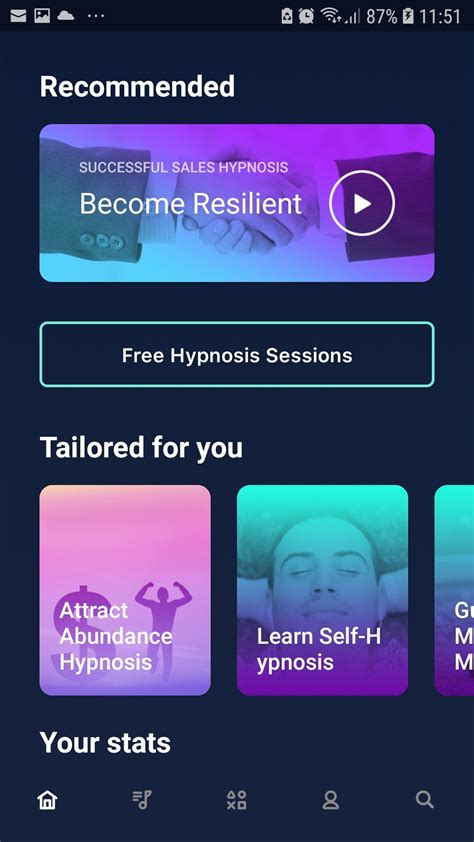The Dark Side of Hypnosis Apps: Exposing the Scams and Deceits
Hypnosis apps have gained immense popularity in recent years, with many people seeking to improve their mental well-being, overcome phobias, and even manage chronic pain. However, a growing number of users have come forward, alleging that some of these apps are nothing more than scams. In this article, we'll delve into the world of hypnosis apps, exploring the mechanisms behind these apps, the benefits and risks associated with their use, and most importantly, exposing the scams and deceits that have left many users feeling deceived and disappointed.
How Hypnosis Apps Work
Hypnosis apps use a combination of guided meditation, soothing music, and subtle suggestions to induce a state of deep relaxation, also known as a trance. During this state, the subconscious mind is believed to be more receptive to positive affirmations and suggestions, which can help users overcome negative thought patterns, build confidence, and develop healthier habits.
Some hypnosis apps claim to use advanced algorithms and artificial intelligence to tailor their sessions to individual users' needs, while others rely on pre-recorded sessions created by certified hypnotherapists. However, with the rise of these apps, concerns have been raised about their effectiveness, safety, and legitimacy.
The Benefits of Hypnosis Apps
When used responsibly and with caution, hypnosis apps can be a valuable tool for:
- Reducing stress and anxiety
- Improving sleep quality
- Boosting self-confidence
- Overcoming phobias and fears
- Managing chronic pain
Many users have reported positive experiences with hypnosis apps, citing improved mental clarity, reduced stress levels, and enhanced overall well-being.
The Risks and Scams
However, not all hypnosis apps are created equal. Some apps have been accused of using deceptive marketing tactics, making false claims, and exploiting vulnerable users. These scams can take many forms, including:
- Misleading advertising: Some apps claim to offer "miracle cures" or "instant results," which are unrealistic and unsubstantiated.
- Hidden fees: Users may be charged recurring subscription fees or forced to pay for additional features or sessions.
- Unqualified practitioners: Some apps may use unqualified or unlicensed practitioners to create their sessions, which can be ineffective or even harmful.
- Lack of transparency: Apps may fail to disclose their methods, algorithms, or potential risks, leaving users in the dark.

Exposing the Scams
One of the most notorious hypnosis app scams involves a company that claimed to offer a "revolutionary" new approach to weight loss. The app promised users that they could lose up to 10 pounds in just one week, without dieting or exercise. However, users soon discovered that the app was simply a rehashed version of an existing hypnosis program, with no scientific evidence to support its claims.
Another scam involved an app that claimed to offer "personalized" hypnosis sessions, but in reality, the sessions were simply pre-recorded and not tailored to individual users' needs.
How to Avoid Hypnosis App Scams
To avoid falling prey to hypnosis app scams, follow these tips:
- Research thoroughly: Read reviews, check ratings, and look for red flags such as unrealistic claims or hidden fees.
- Check credentials: Verify the qualifications and licensure of the practitioners creating the app's sessions.
- Be cautious of free trials: Free trials can be a trap, leading to recurring subscription fees or unwanted charges.
- Read the fine print: Understand the app's terms and conditions, including any potential risks or side effects.
Gallery of Hypnosis App Scams





FAQs
Are hypnosis apps safe to use?
+Hypnosis apps can be safe to use when used responsibly and with caution. However, it's essential to research the app thoroughly, check the credentials of the practitioners, and read reviews from other users.
Can hypnosis apps cure mental health conditions?
+Hypnosis apps should not be used as a replacement for professional medical treatment. While they can be a useful tool for managing symptoms, they should be used in conjunction with traditional therapies and under the guidance of a qualified healthcare professional.
How can I report a hypnosis app scam?
+If you suspect that a hypnosis app is a scam, you can report it to the app store or platform where you downloaded it. You can also file a complaint with the Federal Trade Commission (FTC) or your local consumer protection agency.
In conclusion, while hypnosis apps can be a valuable tool for improving mental well-being, it's essential to approach them with caution and thoroughly research their legitimacy. By being aware of the potential scams and risks, you can make informed decisions and avoid falling prey to deceptive marketing tactics.
